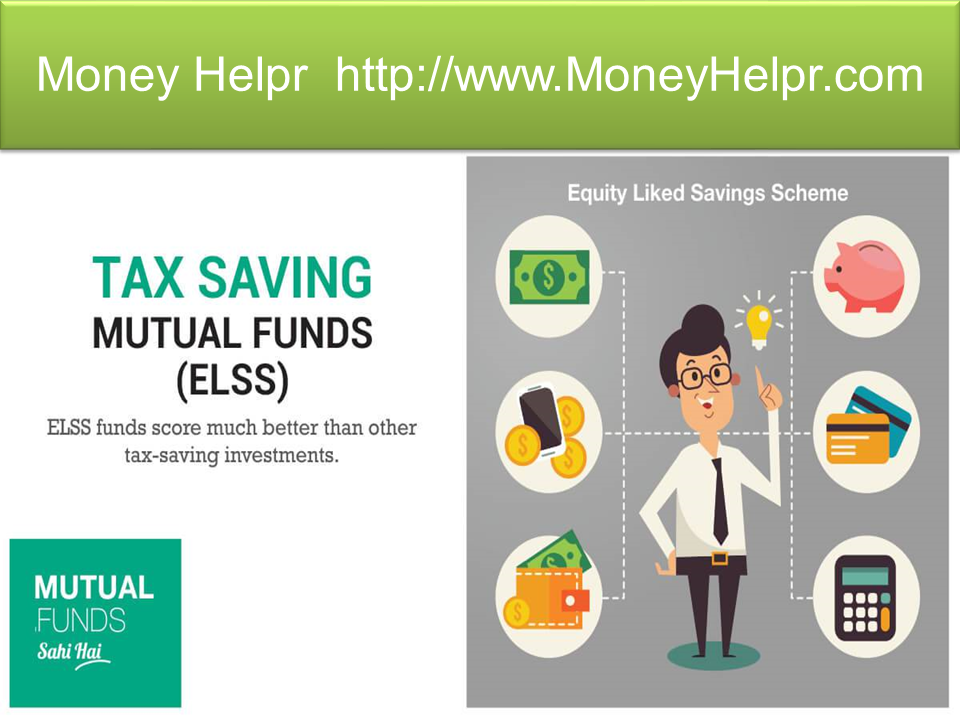ELSS Funds – has turned into a universal term in mutual fund industry.
If we glance at the full form of this term it will say Equity Linked Savings Scheme Fund – sounds different.
Mutual Fund ELSS is a good tax saving instrument but nevertheless it is not accepted by maximum Indians.
Whether you like it or not, you have to pay off your taxes.
The burden is that understanding taxation takes higher than a genius mind.
Tax planning is a fundamental part of your financial strategy. Efficient tax planning enables you to cut down your tax burden to the minimum.
One can work it out by properly taking profit of all tax exemptions, deductions rebate and allowances while ensuring that your investments are in line with your long term goals.
Concept:
ELSS is mutual fund scheme & somewhat comparable to diversified equity funds of Mutual Fund.
As the name indicates, the plan primarily invests in equity market by purchasing equity stocks of companies registered on the stock exchanges.
Benefits of ELSS MF
Tax benefit at the Investment: one can receive tax benefit under section 80 C of Income tax with Maximum limit of Rs 100000.
Shortest duration: ELSS has 3 years Lock-in period which is shortest in comparison to any other tax saving investment. This lock-in is the alone difference between diversified equity mutual funds & ELSS.
Tax free return: Any profit/ capital gain you have from ELSS is totally tax free. If you look at return from NSC & Tax saving Bank FDs they are fully taxable & joined to your income. Only PPF Provides tax- free return but it carries a maturity period of 15 years.
Tax free dividends: ELSS schemes keeps giving dividend on regular intervals & the full dividend you earn is tax free.
High Growth: Equity funds can be volatile in the short run, but have been acknowledged to beat inflation and generate wealth over the long run. If you are seeking at investing some cash that you won’t require future, and are prepared to go with the ups and downs of the market, you may find ELSS a standard tax saving option.
Features of ELSS MF
Tax free + wealth: Investment up to Rs 1.5 lakh in ELSS can be claimed for deduction under Section 80C of Income Tax Act. One can generate wealth by combining their ELSS fund to their long-run monetary goal. By choosing growth option, one can obtain from compounding and build the desired corpus. Investment for up to Rs 1.5 lakh can be claimed for deduction under section 80C of Income Tax Act. One can save a maximum of Rs 46,350, if one is falling under 30 percent tax bracket. If one is falling under 20 percent bracket can save tax for up to Rs 30,900. The scheme falling under such category has the least lock-in period comparing to other tax saving avenues like PPF which has a lock-in period of 15 years; ELSS has merely a 3 year lock-in period.
Risk holding Flexibility: As per one’s risk-taking capability, AMC’s design their scheme on the base of large-cap, mid-cap and small cap and subsequently their risk and a return varies. Therefore, the schemes provide you flexibility in holding the risk while investing. However, you cannot neglect the fundamental of risk as all the schemes are equity-based and market related.
Lumpsum and SIP options: If you cannot invest in one go, that is through lump-sum method. The other option is you can continue for monthly investment mode through systematic investment plan (SIP). Investment in SIP can cut down your burden of installing a huge sum in a month and also, it can serve you through rupee cost averaging over a period of time. The minimum investment requirement for investing in ELSS funds is RS. 500 for one-time/lump sum investments and RS. 500 for monthly investments (SIP).
Tax free returns while redemption: Most of the tax savings instruments attract TDS while making redemption. However, investing money through ELSS scheme makes your return totally tax free if withdrawn after completing the 3-year lock-in period. You can also redeem your money after a year through the exchange in the secondary market. Schemes underneath ELSS class have provided remarkably higher returns in past in comparison to the other tax saving instrument of the money market.
Is ELSS suitable for senior citizens?
ELSS is Associate in investment that’s not utterly focused around senior voters. This is the reason why there is a misunderstanding concerning its advances for senior citizens. Another concept referred to this is that ELSS returns depend on market movements. Thus it is not advisable for senior citizens to invest in it as it requires having a lot of risks. The reality is the opposite though.. ELSS is beneficial for senior citizens in many ways only if a judicious investment is done.
Popular misunderstanding is that Equity Linked Savings Schemes (ELSSs) are not good investment preferences for senior citizens and retired persons.
This grows from the widespread concept that equity-backed investments in any form are unsuited for older and retired people. But as I say above, the truth is the opposite. We should consider the possibility that ELSS holds for senior citizens.
ELSS is more beneficial with a short lock-in period of 3 years. This means that funds can be withdrawn within a short tenure in a case of an emergency. Also after the lock-in period, the withdrawn amount is not taxable.
Another aspect of ELSS is its long-term benefits. It is safe to say that on an average, senior citizens who have just attained the age of 60 have 12-15 years of time to devote to investments. In such cases, ELSS generates the best returns as it has been seen that on a long term basis ELSS reaps highly profitable gains.
Thus both tax savings and high profits requirements are met, which is essential for senior citizens. It is clear that a risk element is associated with ELSS as the scheme depends generally on unpredictable market movements. Though in the long run, it is almost always beneficial, senior citizens might have to consider twice before accepting the risk
ELSS is technically a good retirement scheme. Low investment cost per month (INR 500 minimum), the tax benefits plus the high return rates makes it one of the finest investment schemes.

